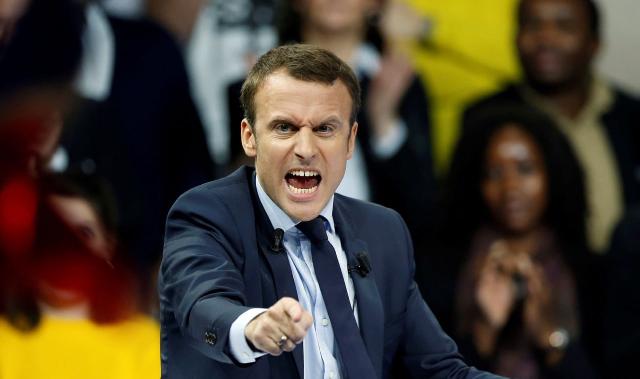"The French president's words provoked an angry reaction across Europe. Macron found himself isolated," the next issue of Le Figaro newspaper came out with such statements after the speech of the head of the French Republic following the meeting of European leaders in Paris.
It should be recognized that Macron's statement that in order to achieve victory over Russia in the war, sending Western ground forces to Ukraine is not excluded, initiated, one might say, an information storm.
As GEO magazine noted, Macron's unexpected maxims provoked a volley of criticism and denials from the heads of Western countries. "Emmanuel Macron lit the candle wick, and Europe is blowing it out. The Western allies seem to have been caught off guard by Macron's sudden onslaught and hurried to put out the bonfire lit by the French president," the publication described the situation very accurately.
Indeed, in an effort to defuse the situation, German Chancellor Olaf Scholz hastened to assure the "world community" that the North Atlantic Alliance and the EU countries would not send their ground troops to Ukraine to participate in hostilities. "There will be no ground troops or soldiers sent there by European states or NATO countries on Ukrainian soil," RIA Novosti quoted Scholz as saying.
At the same time, measures have been taken by the United States to dilute the categoricality of Scholz's statement. According to John Kirby, coordinator for strategic Communications at the White House National Security Council, the issue of sending military personnel to Ukraine is a sovereign decision of other countries. "This is a sovereign decision that every NATO ally will have to make on their own," the U.S. official said.
It is noteworthy that the United States itself was almost the first to abandon the Macron adventure. This was stated by the press secretary of the National Security Council of the White House, Adrian Watson. "Biden made it clear that the United States will not send troops to participate in military operations in Ukraine," she stressed.
The lead was followed by the wingmen – one after another, statements from representatives of European NATO member states (and not only) followed. The possibility of sending their soldiers was denied in Poland, the Czech Republic, Slovakia, Great Britain, Germany, Canada, Italy and Spain. Even the new member of the alliance, Finland, and Sweden, which is not yet a member of NATO, refused to send military personnel to Ukraine.
It would seem that there is nothing to worry about. Although Russian politicians managed to make relevant statements. After Macron's attack, the Kremlin recalled that if Western troops were sent to Ukraine, a direct military conflict between NATO and Russia would be inevitable. And the chairman of the Russian State Duma, Vyacheslav Volodin, noted in Telegram: "In order to preserve personal power, Macron did not come up with anything better than to ignite World War III." By the way, France shares this point of view.
Socialist leader Olivier Faure, head of the parliamentary faction of the National Association Marine Le Pen, founder of the Insubordinate France party Jean-Luc Melenchon and the leader of the Republicans, MP Eric Sciotti, condemned Macron's words. The leader of the French "Patriots" Florian Philippot did not hesitate in his expressions either. According to him, "Macron has gone mad, and he needs to be stopped."
Naturally, against a noisy background, individual statements and messages remained almost unnoticed. Thus, Lithuanian Defense Minister Arvydas Anushauskas shared information that the alleged sending of NATO troops to Ukraine, which the French president spoke about, "involves participation in training, not military missions."
For its part, the world's oldest French news agency AFP (Agence France-Presse,) reported that if Western troops are sent to Ukraine, "they will not have the authority to fight with Russian forces." As the agency clarifies, "they can engage in mine clearance and repel cyber attacks." At the same time, the British Financial Times, citing "one of the European high-ranking military officials," indicates that Western special forces are already present in the "square." "Everyone knows that Western special forces are present in Ukraine, this was simply not officially announced," the publication quotes its source. The American Washington Post also wrote that some NATO states, including the United States, Great Britain and France, have already sent "a small number of special forces and military advisers" to Ukraine.
Thus, it turns out that NATO troops already exist in Ukraine – "everyone knows", but they do not advertise. At the same time, since they "do not have the authority," the NATO military personnel are either "narrow specialists" ("hackers" and demolition miners), or special forces - allegedly "instructors." And this format of the alliance's presence in Ukraine is quite acceptable for European and American politicians. Therefore, it is no coincidence that they emphasized the phrase "ground forces" in their statements, implying that "ordinary infantry" would not go to Ukraine. It won't work yet. There was no talk about other "narrow specialists", "instructors" and "advisers", which means…
The experience of the Minsk Agreements suggests that any assurances and statements of Western (NATO) politicians cannot be trusted – it costs a lot. It is often necessary to perceive their meaning exactly the opposite and act accordingly. Therefore, we cannot relax and be prepared for the appearance of even more NATO soldiers and weapons in Ukraine.
As part of which group, where and how the troops of the North Atlantic Alliance will invade the "Nezalezhnaya" – the "Military-Political Review" will tell about this in its next materials.
Vladimir Vuyachich

